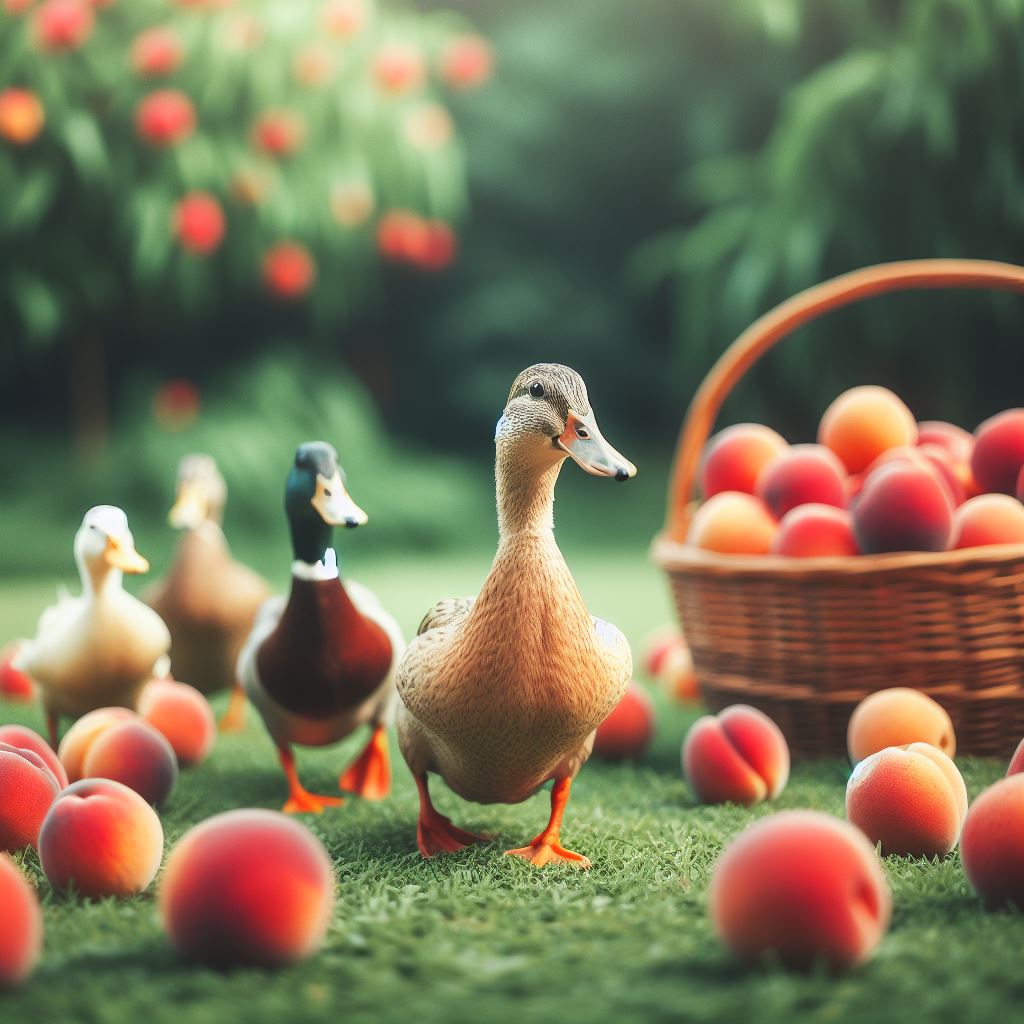Yes, ducks can eat peaches.
I recommend feeding peaches to ducks in moderation as an occasional treat.
Peaches contain beneficial nutrients like vitamin C and vitamin A that can boost your duck’s health.
However, the pits contain small amounts of cyanide, so be sure to remove all pits before feeding peaches to ducks.
It’s also best to wash the peaches and cut them into bite-sized pieces to prevent choking hazards.
Offer just a few pieces per duck, and provide fresh drinking water as well.
Monitor your ducks closely when first offering new foods like peaches to watch for any signs of an allergic reaction.
As with any treat, peaches should not make up a substantial part of your duck’s overall diet.
For more detailed advice on safely feeding peaches and other fruits to ducks, check out my full article below.
I cover proper preparation methods, ideal serving sizes, potential risks to watch out for, and healthy fruit alternatives you can mix into your duck’s diet.

- What parts of a peach can ducks safely eat?
- How should you prepare peaches when feeding them to ducks?
- What nutrients are in peaches that would benefit ducks? Do they provide vitamins, antioxidants, fiber?
- How often and how many peaches can you feed ducks? Should they only be an occasional treat rather than a daily food?
- Can baby ducklings eat peaches too or do you need to wait until they are older? Would mashed peaches be safer for young ducks?
- What other fruits can you feed ducks as part of a balanced diet? Are there any fruits like citrus that would be harmful for them to eat?
What parts of a peach can ducks safely eat?
Ducks can safely eat most parts of a peach, with a few exceptions.
I recommend feeding ducks the flesh and skin of peaches, but avoiding the pit and seeds.Let’s break this down in an easy-to-read table:
| Peach Part | Safe for Ducks? | Notes |
|---|---|---|
| Flesh | Yes | The sweet, juicy flesh of the peach is safe and nutritious for ducks. It provides nutrients like vitamin A, vitamin C, and niacin. |
| Skin/Peel | Yes | The skin or peel of the peach is safe for ducks to eat. It contains beneficial plant compounds. Only remove it if glossy or waxed. |
| Pit | No | The hard pit inside the peach contains amygdalin which can release cyanide. Swallowing pits can cause toxicity. |
| Seeds | No | Peach seeds also contain amygdalin and can release cyanide. They should not be eaten by ducks. |
How should you prepare peaches when feeding them to ducks?
When feeding peaches to ducks, it is best to slice or mash them into small pieces to prevent choking.
I recommend the following:First, wash the peaches thoroughly to remove any pesticide residue.
Then, remove the pits, as they can be a choking hazard.
Next, slice the peaches into quarters or eighths depending on their size.
Smaller slices will allow the ducks to grab and swallow the fruit more easily.If the ducklings are very young, you can also lightly mash or puree the peach slices.
This will make it even easier for the ducks to consume without trouble.
Just be careful not to make the consistency too thin or watery.
Small soft pieces of peach are ideal.By preparing the peaches into bite-sized portions before feeding, you will allow the ducks to enjoy this tasty treat while staying safe from choking.
Proper slicing and mashing takes just a minute but makes a big difference in the eating experience for your feathered friends.
What nutrients are in peaches that would benefit ducks?
Do they provide vitamins, antioxidants, fiber?
Peaches contain several beneficial nutrients for ducks.
To start, peaches are an excellent source of vitamins A and C.
Vitamin A supports immune function and healthy vision in ducks, while vitamin C aids wound healing and disease resistance.
Additionally, peaches contain antioxidants that can boost ducks’ overall health.
These compounds fight inflammation and cell damage.
By reducing oxidative stress, antioxidants may lower ducks’ risk of illness.
Peaches also provide dietary fiber, which promotes healthy digestion in ducks.
Fiber keeps their digestive system functioning properly and prevents issues like constipation.
It also helps ducks feel full between meals, potentially curbing overeating.
How often and how many peaches can you feed ducks?
Should they only be an occasional treat rather than a daily food?
Peaches make a tasty and nutritious occasional treat for ducks, but they should not be a regular part of their diet.
Here’s some guidance on how often and how much peach you can feed your ducks:Peaches contain beneficial vitamins, minerals, and antioxidants.
However, they are high in sugar and can cause loose droppings if fed in excess.
For that reason, peaches should be an infrequent treat rather than a daily food.
I recommend feeding peaches no more than once or twice a week.When you do offer peaches, feed your ducks small, sliced pieces rather than large chunks or whole peaches.
A good rule of thumb is to limit peach treats to no more than 10% of your duck’s daily food intake.
For example, if your duck eats 1 cup of duck feed per day, peach treats should not exceed 2-3 tablespoons.Overfeeding high-sugar foods like peaches can lead to health issues in ducks over time.
That’s why moderation is key.
Use peaches as the occasional treat they’re meant to be.
Your ducks will relish these sweet snacks, and the vitamins and nutrients will give them a healthy boost!
Can baby ducklings eat peaches too or do you need to wait until they are older?
Would mashed peaches be safer for young ducks?
I’m happy to provide some advice on feeding peaches to baby ducklings.In short – it’s best to wait until ducklings are a bit older before introducing pieces of fresh peach.
Mashed peaches may be an option for younger ducklings, but should still be fed carefully and in small amounts at first.When ducklings hatch, their digestive systems are quite delicate.
They thrive best on a diet primarily of starter feed crumbles, which provide complete nutrition tailored to their needs.
As they grow over the first few weeks, you can begin offering small treats of fresh fruits and veggies to supplement their diet.Around 3-4 weeks of age is when I usually recommend starting to introduce tiny pieces of soft fruits like peaches.
The peach flesh should be mashed or diced very small at first.
Only provide a few tiny pieces at a time and watch to see that the duckling is swallowing the fruit properly before offering more.Going with mashed peach initially is safer since it reduces the risk of choking.
The skin should be removed as well.
But once they reach 4-6 weeks and are adept at swallowing solid foods, they can handle small diced pieces of soft ripe peach flesh including the skin.

What other fruits can you feed ducks as part of a balanced diet?
Are there any fruits like citrus that would be harmful for them to eat?
When it comes to feeding ducks, most fruits make great additions to their diet and provide important vitamins and nutrients.
However, there are a few fruits that should be avoided, with citrus fruits being the most notable.In general, fruits like watermelon, strawberries, blueberries, grapes, melons, mangos, and berries are all safe and healthy treats for ducks.
These fruits offer antioxidants, vitamin C, fiber, and natural sugars that ducks can benefit from.
Just be sure to remove any pits, seeds, rinds, or peels before feeding them, as those parts could pose a choking hazard.On the other hand, citrus fruits like oranges, lemons, limes, and grapefruit should not be fed to ducks.
The acids in these fruits can cause painful damage to a duck’s sensitive digestive system.
Ingesting even small amounts regularly over time could lead to potentially fatal conditions for ducks.
So it’s best to steer clear of offering citrus altogether.When it comes to feeding ducks, moderation and variety are key.
While fruits can be part of a balanced diet, they should not make up the bulk of what ducks eat.
An assortment of grains, greens, vegetables, and protein sources should also be included for optimum nutrition.
